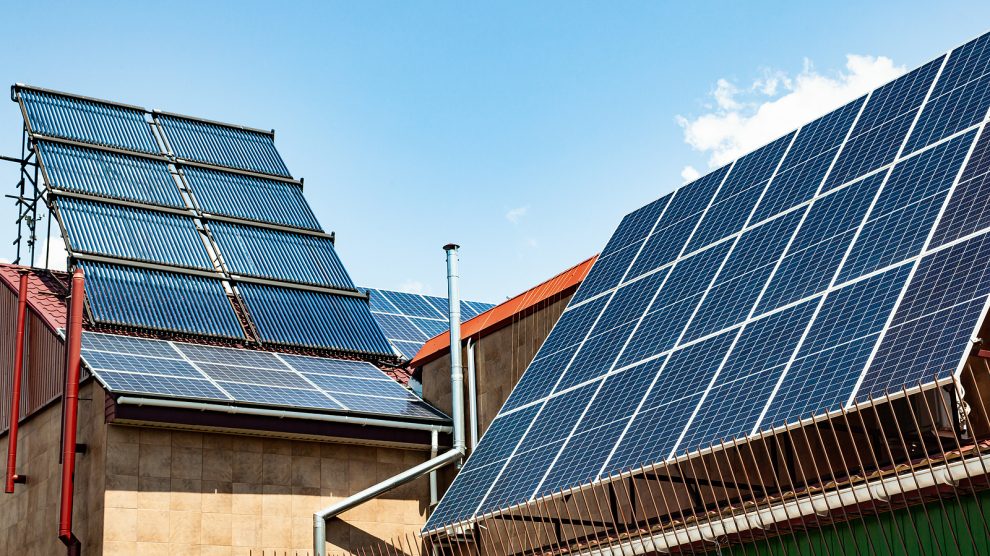Fossil gas is the worst-performing option when it comes to home renovations in seven Central and Eastern European countries, according to a new report commissioned by Greenpeace’s CEE office.
Homes in Romania are losing heat almost four times as fast as homes in Sweden, while 40 per cent of Bulgarian households are at a risk of energy poverty, compared to the EU average of nine per cent. In Poland, just 0.12 per cent of buildings are renovated each year, compared to two per cent in France.
These findings, from a major new report by the Institute for European Energy and Climate Policy (IEECP), commissioned by Greenpeace Central and Eastern Europe, demonstrate that public spending across CEE should not be targeted at further fossil-fuel infrastructure, but rather on energy-efficient upgrades and zero-energy buildings to benefit people, the environment and the economy.
- Poland’s heat pump moment
- Latvia cancels Skulte LNG project, but the Baltic reliance on gas persists
- Central Asia and Europe must work together to tackle the consequences of climate change
Governments in the region, which currently plan to invest a combined 21 billion euros in fossil gas infrastructure, could instead use that money to create 730,000 zero-energy homes and realise huge social, environmental and economic benefits, claims the report.
Cutting demand for gas
In a region which suffers much more than other parts of the EU from energy poverty, cutting demand for gas would not only reduce emissions but also support vulnerable households struggling with their energy bills.
Greenpeace is calling on the EU and national governments to accelerate the rollout of renewable heating, boost deep renovations, and phase out fossil gas by 2035 at the latest.
“These figures clearly show that fossil gas investments are an assault on people, their security and their wallets,” says Iwo Łoś, regional campaign director at Greenpeace Central and Eastern Europe.
“Deep renovations, heat pumps and solar panels not only make countries less dependent on imported, expensive and climate-wrecking fossil fuels, they reduce energy poverty too. It’s a scandal for governments in Central and Eastern Europe to continue to invest in fossil gas despite it clearly being the worst option.”
Greenpeace Central and Eastern Europe commissioned the IEECP to carry out a social cost-benefit analysis comparing the planned gas infrastructure investments of seven governments in the region with different scenarios that would make buildings more energy efficient.
The analysis is in line with the EU’s Energy Efficient First Principle, which says that a government must first check whether an investment in supply infrastructure, such as new gas pipelines, is really needed or whether it can be avoided because another investment in energy efficiency has similar, or better, value for the energy system, the economy, the environment and society.
Social cost-benefit analysis
The study performs a social cost-benefit analysis in Poland, Slovakia, Romania, Hungary, Slovenia, Croatia, and Bulgaria.
According to plans approved in the last 18 months, these countries are planning to spend at least 21 billion euros on fossil fuel infrastructure and supply, as outlined in various National Investment Programmes, National Recovery and Resilience Plans, Large Infrastructure Operational Programmes, Sustainable Development Operational Programmes and Modernisation Funds.
The study examines how the 21 billion euros could be invested in achieving improvements in energy-efficiency, rather than expanding fossil gas infrastructure. It sets out five scenarios.
The baseline scenario looks at investments in more efficient fossil-fuel boilers. The subsequent scenarios compare alternative investments to the baseline in terms of social, economic and environmental costs and benefits. The scenarios consider energy retrofitting of the building, installation of heat pumps, a combination of these, and a final scenario which also considers installing solar panels to obtain zero-energy buildings.
The results show that among all the scenarios investigated, gas investment brings the lowest benefit and greatest losses to national economies. By contrast, zero-energy buildings are the most cost-efficient option everywhere, bringing the most socially and economically profitable solutions.

Phase out gas by 2025
Greenpeace says it wants Central and Eastern European governments to ensure that grants for renovations and zero-energy buildings are at the heart of National Energy and Climate Plans, which are due for review this year.
Governments, it says, should also contribute to the required investments. In line with this, the European Commission should prioritise energy savings measures and conditions which support the energy transition, such as public funding for insulation, renewable heating, and the phase-out of fossil fuel subsidies in its assessment of EU government plans.
In addition, Greenpeace is also calling on the EU ensure that the renovation of buildings becomes mandatory according to the Energy Performance of Buildings Directive in a way that prevents citizens from bearing the cost of these renovations and speeds up a full decarbonisation of the heating sector.
It also wants the bloc to ensure that ending energy poverty becomes a priority of current and future energy legislation, starting with measures that can be easily implemented across countries, like an EU-wide ban on energy disconnections, and to phase out fossil gas by 2035 at the latest.
Unlike many news and information platforms, Emerging Europe is free to read, and always will be. There is no paywall here. We are independent, not affiliated with nor representing any political party or business organisation. We want the very best for emerging Europe, nothing more, nothing less. Your support will help us continue to spread the word about this amazing region.
You can contribute here. Thank you.


